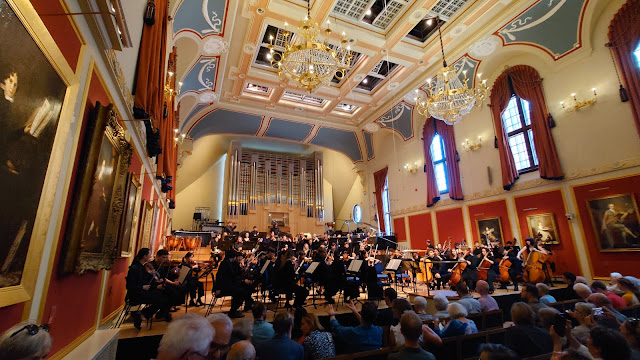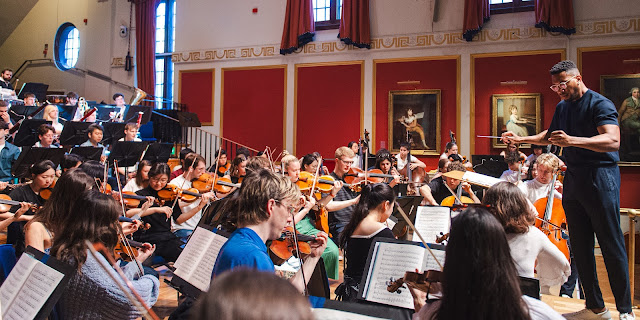 |
| Academy Symphony Orchestra in the Duke’s Hall, Royal Academy of Music just before performing Shostakovich’s Symphony No. 10 |
Shostakovich: Symphony No. 10; Academy Symphony Orchestra, Roderick Cox; Duke’s Hall, Royal Academy of Music
Reviewed 21 June 2024
A performance of Shostakovich’s first post-Stalin symphony, full of energy, vitality, power and surprising warmth, and also very loud
Stalin died in 1953 and by the end of the year Dmitri Shostakovich was releasing new works including his Symphony No. 10. A long work, without any explicit programme, yet the music surely arises from the political climate in some way.
I am of the generation (born mid-1950s) for whom the 1950s was a living memory, the era that our parents talked about and whose events defined them. Also, I have been lucky enough to hear Shostakovich’s Symphony No. 10 conducted by men who had lived through the era.
At the Royal Academy of Music on Friday 21 June, the young American conductor Roderick Cox directed the Academy Symphony Orchestra in Shostakovich’s Symphony No. 10. A work that for all concerned must now be an historical artefact, a work to be investigated, discovered and revealed. Perhaps what was most notable about the performance was the fact that the interpretation did not feel weighted down by its history. There seemed to be fresh ears investigating this music of genius. I have to admit that it is also a work that I have not heard recently, perhaps in decades, so the concert was one of exploration and revelation for all of us.
 |
| Shostakovich: Symphony No. 10 – Roderick Cox in rehearsal with Academy Symphony Orchestra in Duke’s Hall, Royal Academy of Music (Photo: Charlotte Levy) |
The platform was very full indeed, with an orchestra of triple woodwind, five horns, four trumpets, three trombones, tuba, timpani, four percussion and a substantial body of strings. In the relatively compact Duke’s Hall, there seemed hardly room for the audience at all and even the orchestra’s warm-up was loud.
We began with a sense of restraint, a deliberate holding back. Mysterious strings, lyrical yet carefully phrased, and long-breathed clarinet phrases. But then Cox unleashed the orchestra’s power in the first climax, there was a fierce intensity to the playing, but clarity too, the underlying structure of those powerful passages was clear. Restraint returned with the solo clarinet, but the solo flute seemed to make things more skittish and suddenly we had Shostakovich in full ironic mode. Yet this was pointed, but not too sharp, a continuing mellowness to the string tone.
The second climax was all clarity, focused intensity and clean lines, something riveting and compelling, and yet still musical. When things died away, those two lone clarinets brought a real frisson, there was never any sense of the music winding town as Shostakovich pared his forces down, and the flutes this time were definitely not skittish. And throughout the movement, I kept returning to Cox’s sense of restraint, allowing the music space and time, yet speeds were not slow, bringing out a sense of quiet intent from the players.
The second movement scherzo was played with surprising violence and focus, with Cox taking it at a good speed and the players responding with something very in your face. It full blooded and hard, but not nasty, exhilarating too with Cox keeping the impetus, moving ever onwards. Not as angry as some performances I have heard, the noise and energy here were tempered by another quality, a youthful energy.
The third movement Allegretto was graceful, yet pointed, a focused intensity but not as savage as some. With the solo horn, things became suddenly mysterious and rather nocturnal, the quiet intensity balance by more skittish elements. The triple time ‘waltz’ was done in all seriousness and very intent, leading to something violent and powerful, driving on. No irony here. The ending paired quiet menace from the strings with a magical solo horn and poised solo violin.
The opening of the last movement returned us to the dark, threatening cellos of the opening, with an eerie solo oboe. Yet there was a warmth to the playing too as the music slowly unfolded, with some fine wind solos including a plangent bassoon. When the fast section came, things were suddenly tight and characterful, with no let up, driving on and on until things napped. But even the subsequent quiet passages had a sense of menace, whilst a disturbing little march developed into something really violent and there was constant impetus, focus and violence to the end.
This was a performance full of fantastic moments, with strong individual solos from all over the orchestra, yet a focus in the ensemble and a unanimity of purpose in the strings that would be the envy of a professional orchestra. Controlling it all, Cox made each movement seemed one long-breathed, coherent architectonic argument. A performance to remember and treasure.
Never miss out on future posts by following us
The blog is free, but I’d be delighted if you were to show your appreciation by buying me a coffee.
Elsewhere on this blog
- Music like no other: Icelandic composer Gudmundur Steinn Gunnarsson’s Stífluhringurinn – record review
- New colours in old sound worlds: the Portuguese duo, Bruno Monteiro & João Paulo Santos in Elgar, Debussy, Ravel & more – record review
- Time remembered: the 75th edition of the Aldeburgh Festival lovingly recreates the opening night of 1948 Festival – concert review
- A disc that makes you think, but also satisfies as a recital in its own right: Songs for Peter Pears from Robin Tritschler & friends – record review
- Second view: Anna Patalong makes her role debut as Puccini’s Tosca at Opera Holland Park – opera review
- An undeniable gift for melody: Charles Mauleverer’s Overture – record review
- The 75th edition of the Aldeburgh Festival gets off to a good, spirited and proud start – concert review
- The Devil’s Den: I chat to composer Isabella Gellis & conductor Finnegan Downie Dear about the new opera Shadwell Opera is presenting at the Nevill Holt Festival – interview
- Engaging, with an imaginative twist: Rossini’s The Barber of Seville at Opera Holland Park – opera review
- A very modern sort of magic: Handel’s Alcina at the Guildhall School of Music and Drama – opera review
- Home








